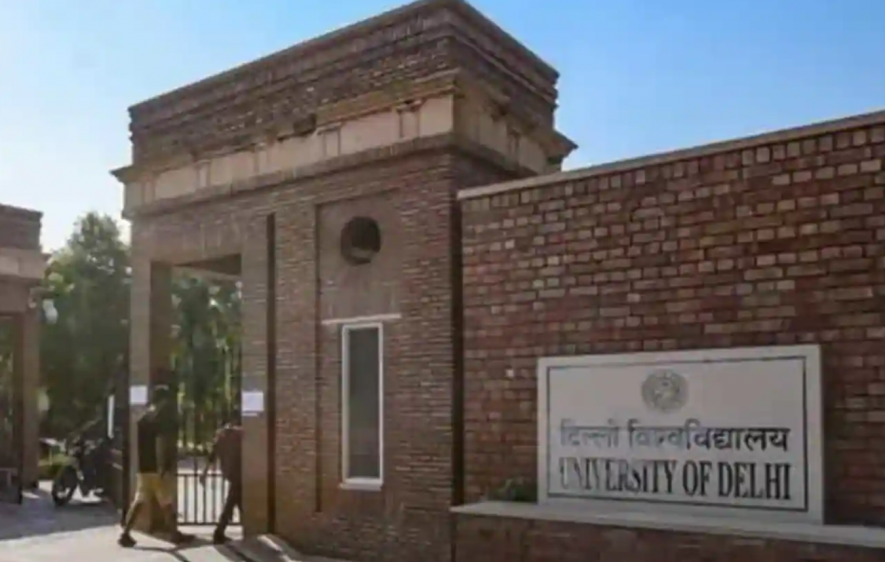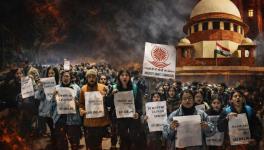New Education Policy ‘Ensures Restoration of Varna System’

Delhi University (DU) teachers protested in front of the vice-chancellor’s office on Tuesday to demand the absorption of more than 4,000 ad hoc teachers of different colleges spread across the national capital and alleged that they are subjected to inhuman working conditions with no job security and limited sick leaves.
Interestingly, the teachers were protesting at a time when Punjab chief minister Bhagwant Mann announced the regularisation of 35,000 group C and D employees in the state.
The teachers are also worried about the announcement of the Four-Year Undergraduate Programme (FYUP) with truncated credits and a common entrance test for undergraduate courses. During the undergraduate programme, a student is awarded credits in different subjects enabling him/her to pursue further studies.
The teachers told Newsclick that students in three-year undergraduate courses earned more credits. Jitender Meena, an assistant professor of history at Shyam Lal College, said that the “university introduced several changes in the last decade”—from annual examinations to semester-based exams and the FYUP and its rollback to a Choice-Based Credit System and finally return of the FYUP in its new avatar with a diluted curriculum.
“Angry with the abrupt changes and the growing job uncertainty, DU teachers had gheraoed the V-C’s office on December 5, 2019, compelling the then-ministry of human resource development to promise that no temporary teachers would be laid off until all posts were filled up,” Meena said at the protest site. “But few teachers were asked to leave because the colleges do not have much workload. This protest is to remind the university about that promise.”
Marginalised communities, according to Meena, will be the main causality of the new DU system. “The new UGC diktat has made class 12 marks irrelevant for admission to Central universities. Students will have to spend more on coaching institutions to crack the entrance exam and spend one extra year to complete graduation. Over the years, universities helped weak and marginalised students to move upward on the social ladder. The new system cheats them of their constitutional rights.”
The teachers also alleged that the New Education Policy (NEP) is the “restoration” of the Varna system, which divided Hindus into four classes. Rudrashish Chakravarty, a former member of DU’s academic council, said that the policy has “restored the Varna system, under which one segment of society dominated another culturally, socially and economically”.
Besides, the “looming danger of retrenchment of teachers under the NEP should not be seen separately”, Chakravarty added. “Any reform should augment the strengths and remove the weakness of a system. However, the NEP is asking students to forget about strengths and focus on commonalities. In the name of interdisciplinary subjects, trash cannot be offered to students. Earlier, we offered 148 credits out of which 108 were earmarked for core subjects. The new course structure offers 80 credits for core subjects out of 176 credits. Students would have to pay one-third extra money and time for the same course.”
Chakravarty alleged that the government is “diluting the education system in the name of getting rid of the Macaulay system by imitating the failed American model, where private universities like Harvard and Princeton run on private endowments”. According to him, the new system “removes the components of the education system which trained students for skills, employment and research”.
“Essentially, the NEP is not a well-thought-out policy with many inconsistencies,” Chakravarty further alleged. “If the government is so eager to adopt an education system from the West, then why doesn’t it go for German, French or Scandinavian countries whose Constitutions make the state bear the responsibility of education?”.
Chakravarty said that the new structure has made “teachers anxious” because it has divided the curriculum into core and electives. “Advocating 50% credits for core subjects means that only half of the faculty will remain permanent while the remaining could be out of jobs depending on the work pressure.”
The “worst part about the new system is that it has done away with intermediary courses like MA and MPhil. In undergraduate courses, one is initiated into subjects whereas in postgraduation, the student masters a subject. The workload was never determined on the basis of credits but on the basis of student-teacher ratio and the overall workload of the department”, Chakravarty added. “Offering such diluted courses means maintaining an army of poorly educated students who would remain unemployed. Essentially, it is returning to the Varna system, where the regressive forces come together to ensure no intellectual growth of society.”
Mithuraj Dhusiya, who represented the concerns of the teachers at the academic council meeting inside the Vice-Regal Lodge, in a dissent note, submitted: “Admission through CUET [Common University Entrance Test] will make the terrain even more unequal. Such a filter will result in additional expenditure for parents and students towards coaching and therefore, marginalise those coming from disadvantageous backgrounds. Recently, the Madras High Court in a case on NEET concluded that the entrance exam has benefited only students who spend lakhs of rupees on coaching classes and put rural students at a disadvantage. The Madras HC advised the Centre to take note of it.”
In his dissent note, Dhusaiya added: “The new system will curtail the autonomy of institutions to respond to ground realities. Science courses sometimes have as much as 30% dropout within a year as students shift to technical courses or decide to prepare for that again. Cut-offs are decided so as to have desired over-admission to ensure that seats do not go empty at any cost within a few months of admission closure. This helps institutions (1) to give chance to more students who would otherwise miss admission even as seats fall vacant a little later and (2) retain teachers as the employment of teachers is on the basis of sanctioned strength or actual— whichever is less. It is important to discuss if the new system will provide such flexibility to institutions.”
Get the latest reports & analysis with people's perspective on Protests, movements & deep analytical videos, discussions of the current affairs in your Telegram app. Subscribe to NewsClick's Telegram channel & get Real-Time updates on stories, as they get published on our website.
























